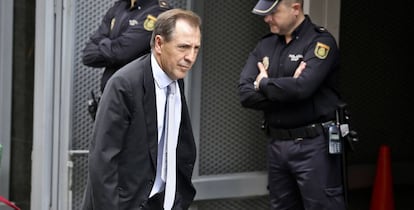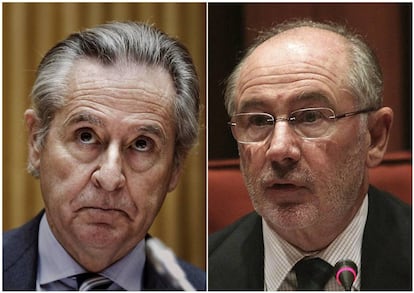Bank execs who returned money in Spain’s credit card case could avoid jail
But court unlikely to exempt senior Caja Madrid officials, among them former IMF boss Rodrigo Rato
The 65 former bank executives and board members at Caja Madrid and Bankia who were found guilty of embezzlement on Thursday in the “black credit card” case received varying sentences depending on whether they had previously returned the money or not. The ruling by the Audiencia Nacional, Spain’s central high court, considered this refund a mitigating circumstance, opening the door for some of these individuals to avoid prison.

The 65 people involved in the case spent a collective €12.5 million between 2003 and 2012 on personal expenses ranging from holidays to jewelry, to expensive restaurants, all paid for with credit cards unofficially extended to them by the heads of the Caja Madrid savings bank, then later at Bankia, the entity that resulted from the merger of seven struggling regional lenders.
The top convictions were for former Caja Madrid chairman Miguel Blesa, who was sentenced to six years in prison, and for his successor Rodrigo Rato, a former International Monetary Fund (IMF) chief who was also deputy prime minister of Spain between 2003 and 2004. He received a four-and-a-half-year sentence, which he says he will appeal.
All 65 will have to return the money, with interest, to the Orderly Bank Restructuring Fund
Former Caja Madrid Director General Ildefonso Sánchez Barcoj received a two-and-a-half year sentence.
All 65 will have to return the money, with interest, to the Orderly Bank Restructuring Fund (FROB), a banking bailout program started by the government in 2009 to shore up Spain’s struggling savings banks. Despite a spate of mergers, Bankia had to be partly nationalized in 2012, when Spain requested an EU rescue package for its banking sector.
Execs and board members who had already returned the money to the FROB were treated with greater leniency than those who had deposited it in court, in the hopes of getting it back if they received a favorable sentence. But this mitigating circumstance was not applied to Rato or Blesa.

Among the board members who never returned the money are representatives of the United Left (IU), the Popular Party (PP), the Socialist Party (PSOE) and both major labor unions, Comisiones Obreras (CC OO) and UGT.
When the scandal broke, executives claimed that the credit cards were a bonus on top of their salaries, even though there was no written record of their existence on job contracts. Nor was that extra income reported to the tax authorities.
The story of lavish spending by bank officials appointed by unions and political parties was especially aggravating to Spaniards who were then struggling through the worst economic crisis in living memory.
English version by Susana Urra.
Tu suscripción se está usando en otro dispositivo
¿Quieres añadir otro usuario a tu suscripción?
Si continúas leyendo en este dispositivo, no se podrá leer en el otro.
FlechaTu suscripción se está usando en otro dispositivo y solo puedes acceder a EL PAÍS desde un dispositivo a la vez.
Si quieres compartir tu cuenta, cambia tu suscripción a la modalidad Premium, así podrás añadir otro usuario. Cada uno accederá con su propia cuenta de email, lo que os permitirá personalizar vuestra experiencia en EL PAÍS.
¿Tienes una suscripción de empresa? Accede aquí para contratar más cuentas.
En el caso de no saber quién está usando tu cuenta, te recomendamos cambiar tu contraseña aquí.
Si decides continuar compartiendo tu cuenta, este mensaje se mostrará en tu dispositivo y en el de la otra persona que está usando tu cuenta de forma indefinida, afectando a tu experiencia de lectura. Puedes consultar aquí los términos y condiciones de la suscripción digital.









































